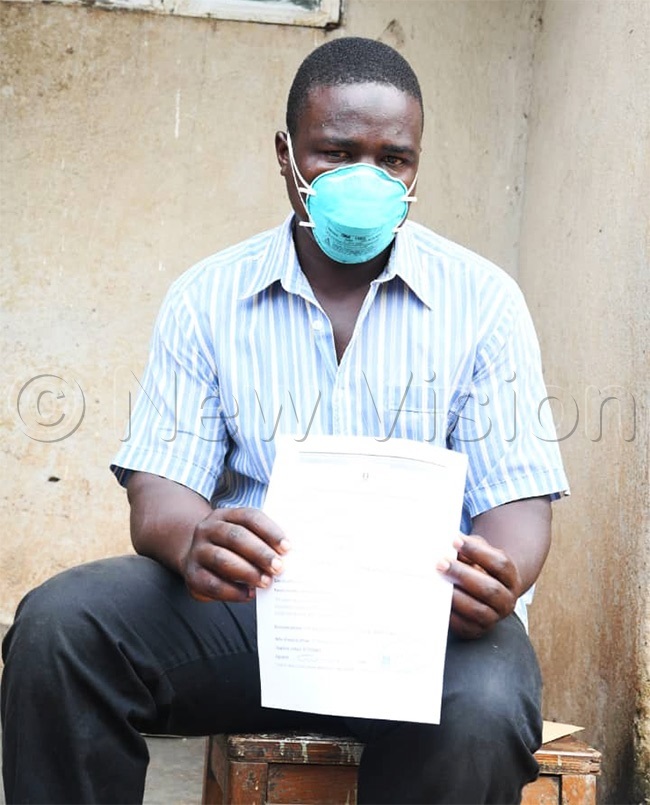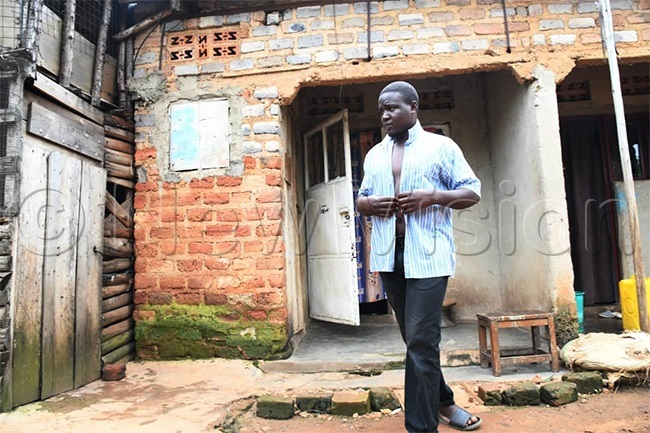COVID-19: Survivor narrates rejection
Apr 29, 2020
He looked forward to a hero’s welcome, but got the shock of his life when he was met with suspicion and resistance upon returning home.

COVID-19
On Monday, Musa Miiro was delivered home after spending 18 days on Covid-19 treatment at Entebbe Grade B hospital. He looked forward to a hero's welcome, but got the shock of his life when he was met with suspicion and resistance upon returning home. Eddie Ssejjoba talked to him about his experience.
Musa Miiro, a boda boda rider, believes he got coronavirus in the course of his duty from a passenger. The 26-year-old is a resident of Ziika Zone in Kisubi on Entebbe Road in Wakiso district. He has been at Entebbe Grade B Hospital for 18 days until he tested negative. But on return to his village, he was shocked by the hostile reception. His neighbours, friends, and fellow village mates shunned him and threatened to lynch him. They demanded that he leaves the area, lest he infected them with Covid-19.
His landlord has asked him to look for a house elsewhere and his boss, the owner of the motorcycle that he was riding, has withdrawn it from him. He is now jobless.
The virus
Miiro's ordeal started with a call from a usual customer who asked him to deliver her home.
"I picked her from a fenced residence, which comprised several housing units. She asked me to take her to another home. There was nothing unusual about it, but when I started getting a high temperature and dry cough, I became suspicious. I was later told that she had escaped from an isolation centre," he narrates.
Miiro had heard about Covid-19. Two days after, President Yoweri Museveni ordered the initial lockdown, which saw all schools and churches closed, he sent his wife and two children to his father's home in Kapeeka, Nakaseke district and promised to keep sending them money for upkeep. Little did he know that he would be a victim sooner.

Hospital
On March 27, Miiro developed a running stomach, dry throat, fever, and headache.
"I had worked without eating and I thought I had developed ulcers. The next day, I stayed home, but I was alarmed that my condition worsened. I waited until March 30. Doctors at Kisubi Hospital measured my temperature and asked me several questions on how I was feeling. They transferred me to a ward and asked me to wait for about two hours. Another team from Entebbe Hospital arrived and checked me again and then obtained my samples. They gave me treatment and I returned home," Miiro narrates.
But he did not return home. Instead, he went to his grandfather's home in Bwebajja. Two days later, on April 1, he received a phone call, asking him to pick his results.
"I told them I was too weak and promised to send someone to pick them. When they continued calling me using different phone lines, I picked the courage to go by myself," Miiro says.
Evacuation
"At the hospital, I lied that I had been sent to pick Miiro's results. They asked me to lead them to Miiro's home because he had tested positive for coronavirus. I agreed, but I did not know what I was thinking at this time," he says. They moved in an ambulance. His motorcycle was ridden by one of the medical workers. A few metres before reaching the place, Miiro disclosed that he was indeed the patient they wanted. To be certain, the medical team asked people in the village to verify. That is how the news spread that Miiro had the coronavirus.
"Some felt sorry for me and encouraged me to remain strong. I tried to smile, but the fire was raging inside me. I wanted to cry.
The ambulance later sped off towards Entebbe. It was 10:00 am. I was not so sure if I would ever return home," he narrates. The ambulance delivered him to Entebbe Hospital right at the ward.
"A team was waiting. They sprayed me with disinfectant. I was frightened. However, I was encouraged by my friends who called to assure me that I would recover like many had. Since I was not a smoker or an alcoholic, I was assured that my chances were high," Miiro says.
At the ward
He was taken to Room VIP 2, where he occupied one of the two beds. A team examined him, gave him some drugs and left.
"I remained alone with machines. I spent most of the time praying to Allah to get me through. I routinely woke up at 6:00pm to pray. I never missed a single Swallah. I devoted more time to prayers because I knew it was only Allah who could get me out of that situation," he says.
Miiro spent his day in bed, listening to the radio on his phone. Doctors would come in at 7:00 am, take his temperature, and ask how he felt. They gave him several drugs.
"I took whatever drugs I was given. Later, the chest pain and backache went away. They regularly obtained samples from me but did not give me results. When I asked, they promised they would release all the results at once. I later found out that, out of the four patients in an adjacent ward, three had been discharged and one remained because she had refused to take some of the drugs," he narrates.
Breakfast would be served at 9:00 am lunch at 1:00 pm and supper between 7:30 pm and 8:00 pm. In between, Miiro would walk around and do drills in the corridors. Sometimes, he also washed his clothes.

Discharge
One Monday, five days before he was discharged, a doctor informed Miiro that he would return home soon.
"I was happy. I could not believe I had fought and won. I called people to give them the good news, but they said my voice was shaky," he said.
Returning home
Before Miiro was discharged, officials from the health ministry went to his home and at his stage and told his neighbours and colleagues that he had recovered. They also used a local community radio to communicate to people to get ready to receive me back.
He was delivered on Monday by ambulance. He hoped to receive a hero's welcome.
"On the contrary, people took off, saying I was going to infect them with coronavirus. It was a rude reception. I opened my house, but nobody came to greet me. I walked to the nearby shops to buy some items, but they refused to give them to me and told me to keep away," Miiro says.
Only one local Village Health Team worker accepted him. She gave him food.
"When I went to another location to buy something, people tipped the Police about me. The officer in charge sent three men to intercept me. They found me speaking on the phone near a newspaper stall and ordered me to return home. The officer said I must not move anywhere because I could infect people. But I had no one to send to the shops, so my choices were limited," he says.
Miiro had not paid rent of sh80,000 for February, March and April. The landlord used that reason to ask him to leave. Even his boss told him that he had given away the motorcycle. Worse still the landlord was furious with Miiro for causing him to be put under isolation.
"I am now jobless. I have no money and I am alone. I am unable to send any assistance to my wife and children in the village. I have to relocate to another village because I have become an outcast here," Miiro said.
Miiro Gets assistance
Bukedde newspaper, a sister paper, published his predicament on Wednesday. When Sylvia Namutebi, a philanthropist also known as Maama Fiina, read the story, she visited him and gave him sh2m to clear his rent and buy food.
She also promised to buy him a motorcycle to enable him resume work.
Maama Fiina also asked neighbours not to discriminate Miiro, saying he had been discharged because he was healed. She appealed to the Government to create a fund to help coronavirus survivors who become vulnerable.
